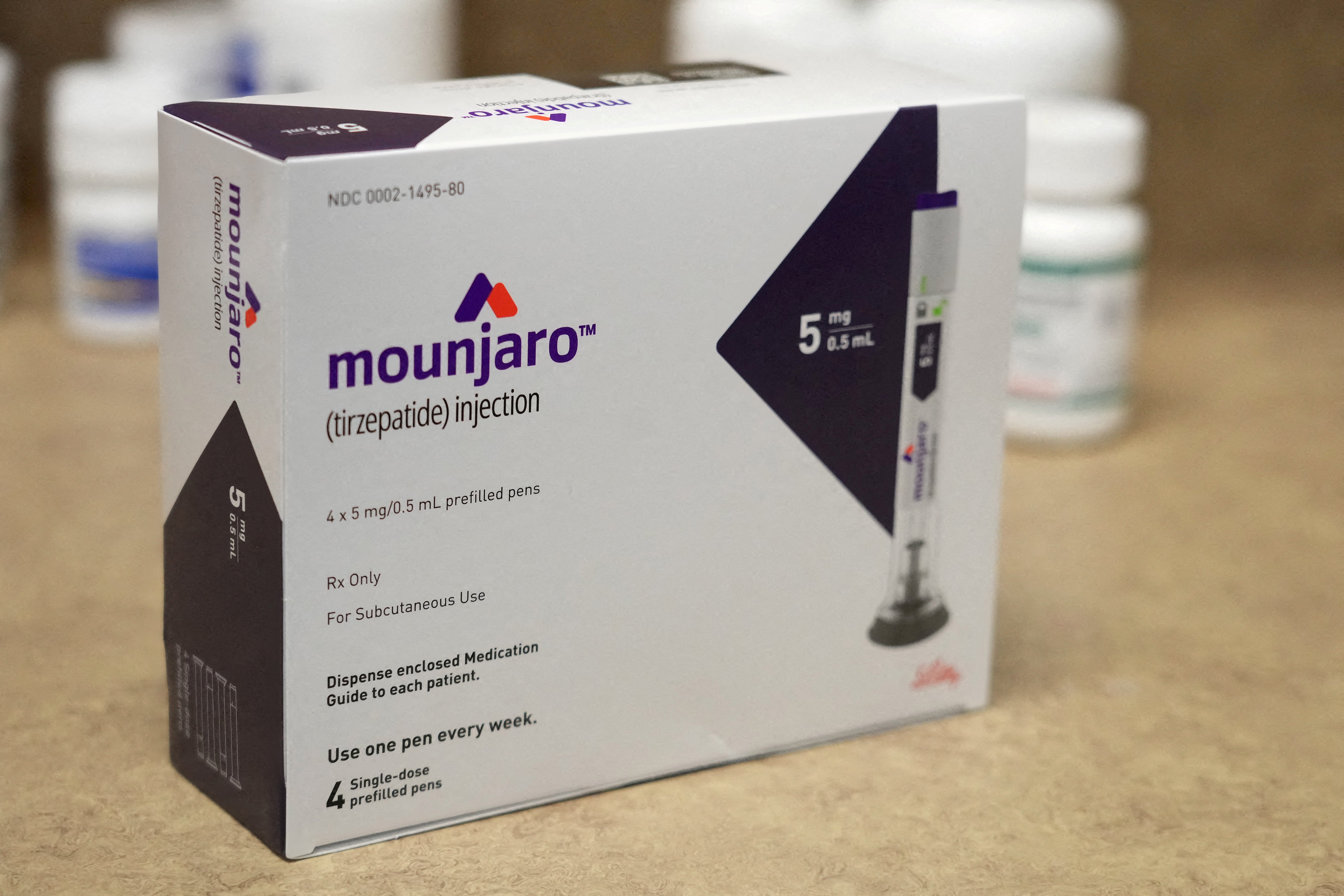How Mounjaro became the ‘King Kong’ of weight loss jabs, but here’s the catch...
The first head-to-head trial of obesity drugs reveals a clear winner for effective weight loss. But how does it work, and what are the long-term effects? Anna Magee reports

A new weight loss drug that can help people shed up to a quarter of their body weight has outperformed all existing obesity medications in the first head-to-head study of its kind. Until now, only weight-loss surgery has achieved similar results. With 25.9 per cent of Britons classified as obese and another 37 per cent overweight – and with obesity linked to over 250 chronic conditions, including heart disease and cancer — experts are calling this a major breakthrough.
Dubbed the “King Kong” of weight loss jabs, Mounjaro, the brand name for tirzepatide, is a weekly injection licensed to treat type 2 diabetes on the NHS. Findings have shown some users can lose up to 25 per cent of their body weight in 18 months – that’s 10 per cent more than other popular weight loss medication Wegovy over the same period.
The latest trial included 751 people from across the US who were overweight or had obesity and at least one other weight-related health problem, but not diabetes. Participants received weekly injections of the highest tolerated doses of Zepbound, either 10 milligrams or 15 milligrams, or Wegovy, 1.7 milligrams or 2.4 milligrams.
Clinical trial participants who took tirzepatide, the drug sold as Zepbound or Mounjaro, lost an average of 50 pounds (22.8 kilograms) over 72 weeks, while those who took semaglutide, or Wegovy, lost about 33 pounds (15 kilograms). That's according to the study funded by Lilly, which was published on Sunday in the New England Journal of Medicine.
That makes the drug tirzepatide now the most powerful non-surgical option on the market for large-scale weight loss today. It’s been made available privately for weight loss patients who have a body mass index (BMI) of 30 or more, and those who have an index of 27-30 as well as a weight-related condition like heart disease or high blood pressure. But does it sound too good to be true?
Mounjaro is the third in a line of weight loss injections available in the UK, which all work by affecting hunger hormones to reduce appetite. In 2020, the first weight loss injection available in Britain was Saxenda (or liraglutide). It’s taken once a day with a self-injecting pen, and in trials, around 56 per cent of patients lost 10 per cent of their body weight. The second was Wegovy (which is one of the brands that uses semaglutide, the same as Ozempic), which was launched in September 2023. Like most of these new drugs, you take it once weekly and can take a few weeks to work.
Originally approved for use on the NHS as a treatment for managing blood glucose in people with type 2 diabetes, Ozempic was increasingly prescribed off-label to those with weight problems. This created a knock-on effect for people with type 2 diabetes and led to a nationwide shortage.
As a result, Wegovy – a separate brand formulated specifically for weight-loss patients — was launched to meet growing demand. The arrival of Mounjaro and similar new drugs offered welcome relief amid widespread shortages, although waiting lists continue to soar.
How does it compare to others?
The main difference, according to experts, is the sheer amount of weight you can lose. “Wegovy was already very effective, and shown in trials to lead to a weight loss of up to 15 per cent of a patient’s body weight within 18 months,” says Barbara McGowan, professor of endocrinology and obesity at King’s College London.
“Once you can lose more than 10 per cent of your body weight, there’s quite a high chance you’ll start impacting chronic risks associated with obesity such as heart disease and stroke,” says Dr Tom Curtis, a London-based GP and medical lead for Oviva, an app that prescribes obesity management programmes. “Having the first medication that could get people beyond that 10 per cent weight loss was a landmark moment for obesity medicine.”
But research on Mounjaro, called the “Surmount-1 trial”, showed that, on average, patients lost a fifth of their baseline weight, while some even lost up to a quarter. “The big change is that with Mounjaro we’re seeing weight loss similar to that which we see with bariatric [weight loss] surgery,” says McGowan. “That’s a huge change in obesity medicine, as up to now there has been such a huge gap between lifestyle measures and surgery. These new pharmacotherapies are bridging that.”
So how does it work?
All three weight loss jabs work by mimicking a hormone called GLP-1 which affects appetite and helps keep blood sugar stable, says Dr Luke Pratsides, a GP and medical director for men’s health app Numan. But in Mounjaro, there’s an additional hormone affected called GIP or gastric inhibitory peptide, he explains, which increases these effects helping people eat less. Mounjaro is licensed on the NHS for treating type 2 diabetes and in December 2024 it was also approved for treating obesity and is available on the NHS within specialist weight management services in England.

The way these drugs reduce appetite and keep blood sugar level for longer is by slowing down the rate at which the stomach empties. Most of the side effects are therefore gastrointestinal, the most common being nausea which 22 per cent of patients experience; diarrhoea which is seen in 21.5 per cent; vomiting in 13 per cent; and constipation in up to 9 per cent.
Are there any long-term side effects?
“As with any rapid weight loss people lose fat but also lose quite a lot of muscle,” says Dr Curtis. “So, unless patiends careful to maintain their protein intake and add in resistance exercise to their routines while taking it, the risk is they will lose muscle mass that keeps people well and is important for long-term blood sugar and appetite control. Plus, if the drug is stopped people put fat back on, not muscle.”
Long-term risks seen in clinical trials for Mounjaro include a risk of developing pancreatitis, which causes acute abdominal pain. “The pancreas produces a lot of hormones to do with digestion and appetite so there may be something there causing the risk but it’s not yet determined why,” says McGowan. That’s why it’s so important to talk to your doctor about your specific risks.
How do you know which drug is for you?
There are a few factors to consider, says practising GP Dr Kathryn Basford, who prescribes privately through Asda Online Doctor. “Saxenda needs to be injected every day, so if there are any side effects, the dose can be changed more quickly to help manage them.
“With Wegovy and Mounjaro, you don’t need to inject as often – it’s done weekly – because they break down more slowly in your body. If you find yourself struggling with the associated side effects of Wegovy or Mounjaro, then Saxenda may be more suited to you. Regardless, each medication is effective at achieving weight loss and works in a similar way. This is why evaluating personal preferences, lifestyle, medical history, and potential side effects with a doctor is crucial.”
But that is assuming there is a choice. At the moment, what a patient is prescribed is driven largely by what is available. In terms of who’s eligible, it’s worth a chat with your doctor if your BMI is 27 or over. Pratsides says conditions that he would consider prescribing such treatment for may include not only chronic conditions like heart disease and high blood pressure but also common problems like joint pain, sleep apnea and erectile dysfunction, all closely linked with obesity.

As for how long you should take them, many of these drugs are currently only licensed by Nice for two years of use for weight loss. “From trials when people come off drugs like Wegovy and Mounjaro we know they usually regain the weight,” says McGowan. “Obesity is a chronic disease and it’s misunderstood by everyone,” she says. The simple answer, she asserts, is to stay on.
Mounjaro is licensed on the NHS for the treatment of type 2 diabetes, and patients taking it for that stay on it for life, something McGowan says could also work in the case of obesity.
“Take high blood pressure or high cholesterol, if I give you a blood pressure tablet, your blood pressure goes down, if you stop the blood pressure tablet, the blood pressure goes back up. The same goes if I give you a statin to get your cholesterol down. Obesity is a chronic illness too, driven by biological, genetic and environmental factors, and obese people tend to have gut problems that disrupt their appetite. Drugs like these reduce their appetite and can help them manage the condition longer term.”
So, what would a gut doctor say about them? Tim Spector, professor of genetic epidemiology at King’s College London and co-founder of the Zoe app, agrees that these new drugs can hugely benefit some people. However, he believes they still need to be used alongside lifestyle interventions like diet and exercise.
“For instance, one of the side effects of these drugs is nausea, so it can be more challenging to take in the nutrients your body needs”, he says. “Because these drugs significantly reduce appetite, it’s even more important to make sure you eat well. If you’re eating less, and what you are eating is low quality, there’s a risk of becoming nutrient deficient.
He also notes that both drugs can produce gut symptoms, including nausea, diarrhoea, and constipation. “In the short term, they reduce blood sugar levels by reducing the amount of food we eat and will have a similar impact on reducing blood fat levels. They slow the speed at which our stomach empties as well, making people more prone to belching and heartburn.
“At the moment, we don’t really know what the long-term effects are.”
Most of these drugs work in similar ways, and because they are relatively new, in terms of how they perform is likely to vary between people. But while there’s no doubt they can work incredibly well, they’re no magic bullet. “I was working in an obesity management service in the early stages of using the first weight loss injections two years ago,” says Dr Curtis.
“We’re still only just getting those first patients to come to the end of their two-year courses, so we haven't built up a good body of data to really know what happens when people stop. We know from the trial data that people will regain two-thirds of their lost body weight within a year if there are no lifestyle interventions.”
That means it’s not goodbye to the gym just yet.
An earlier version of this article was published in 2024


Join our commenting forum
Join thought-provoking conversations, follow other Independent readers and see their replies
Comments